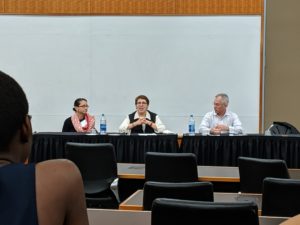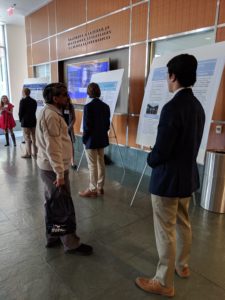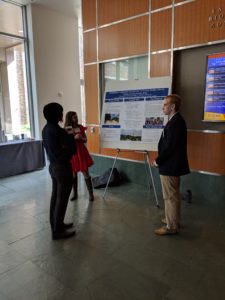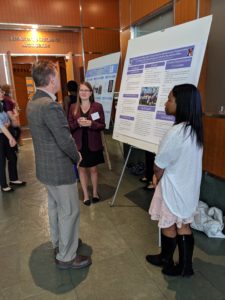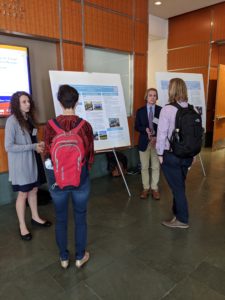Written by Madeleine Munn ’19.
Nine of our lovely GHFs attended the Duke Fitzpatrick Institute for Photonics for their 2019 FIP Symposium of Science and Photonics Technology. The symposium is two days of speakers, photo sessions, and panels. The GHF group left NA at 6:00 Tuesday morning (fueled by donuts from Mrs. Goodson), and left after lunch and shopping at the Duke student store. It was a wonderful day of early morning driving, interesting new knowledge from the world of public health and engineering, presentations about our projects, and fun road trip riddles on the way home. Here are some more details from a few of our students today…
Part One: Panel
Written by Erin Clayton ’21.
We were greeted by the staff and faculty hosting the conference and reconnected with Dr. Robert Malkin. Dr. Malkin is a Professor of Biomedical Engineering and Global Health at Duke and is also the Director of the Global Public Service Academies, or GPSA, who the fellows travel with to Belize over the summer.
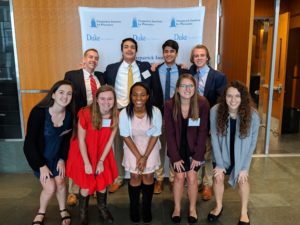
GHFs gather before the panel at the FIP Conference
We were soon shuttled into a panel discussion, focused on Global Health STEM Outreach and using students in public service settings. The panel was moderated by Brittany Ploss, the project manager at the Duke Center for Applied Genomics and Precision Medicine and the Assistant Director at GPSA. Panel members included the aforementioned Robert Malkin, Leslie J. Calman, and Tamara Fitzgerald. Leslie J. Calman is the CEO of Engineering World Health, a nonprofit focused on using undergraduate and graduate students to fix equipment in developing settings. Tamara Fitzgerald is the Assistant Professor of Surgery and Assistant Research Professor of Global Health at the Duke School of Medicine.
The hour-long panel began with a question on the impact on communities with global health work as well as the impact on students. When regarding impact on the community, all three panelists agreed that impact is greater when it is a local community led campaign instead of outside forces. The conversation then transferred into capacity building, discussing the difficulty of finding jobs and salaries for people once they are trained. Next up was the question of the biggest issues the panelists were presented with. They discussed finding information from reliable and trustworthy sources. Next, Dr. Malkin touched on culture shock for students and the importance of patient interaction and support. The discussion came to a close with a question by Sahib Chandi (GHF ‘20) on the “brain drain” and how to prevent trained doctors from leaving. Brain Drain is a term coined by global health experts to describe when affluent, educated people leave a developing country and move to a country with access to better resources and higher salaries. While the panelists admitted they had no solution to doctors moving to developed countries, they agreed that investment from governments and private organizations is the best way to provide enough incentive for educated people to remain in countries lacking certain benefits. The panel provided an excellent opportunity for the fellows to continue to expand their knowledge of global health and I am thankful to have had the opportunity to attend the conference!
Part Two: Poster Presentation
Written by Sahib Chandi ‘20.
After we attended the panel discussion with Dr. Calman, Dr. Fitzgerald, and Dr. Malkin, we presented posters of our project work in Belize to those attending the Global Health section of the FIP conference. Our project presentations included our Health and Nutrition curriculum, Women’s Empowerment Curriculum, Technological Literacy, Community Exercise Initiatives, and advocacy and support of Community Health Workers. As graduate students and professionals in the field came to our posters, we had some very interesting discussions that we did not expect to have. Particularly, as my group presented our work with Nutrition Education, new conversations ranged from food deserts, approaches to sustainability, and the language barrier of working on the field.
Back to Madeleine… As you all can see, the conference was a fantastic opportunity not only for learning, witnessing, and supporting, but also for sharing our work with people who could offer valuable feedback. Now, back to work with eyes toward Belize 2019!
